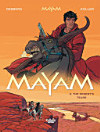I.R.$
អំពីសៀវភៅអេឡិចត្រូនិកនេះ
អំពីអ្នកនិពន្ធ
Born in 1965 in Belgium, Bernard Vrancken quickly revealed himself as a talented artist. At 15, he was honoured in a competition organised by the Académie des Beaux-Arts, which gave him the opportunity to meet some of the European comic-book industry's big guns, such as Franquin and Yvan Delporte. At just 16, he had already published several great historical epics in Tintin magazine. A regular workaholic, he was constantly drawing, erasing, sketching, improving, starting over and learning. Then it was a chance meeting with Stephen Desberg, who quickly became his favourite writer. Together they created 10 short stories for A suivre... magazine, followed by a romantic saga called Le Sang Noir (Lombard), before eventually creating "I.R.$." for Lombard's Troisième Vague collection.
Stephen Desberg was born in Brussels on 10 September 1954 and started writing scripts under the guidance of Maurice Tillieux. He collaborated on Tillieux's last "Tif et Tondu" stories ("Le Gouffre interdit" in 1978, then "Les Passe-montagnes") and then wrote the series on his own until the departure of Willy Maltaite (Will) in 1990. Desberg produced other stories for Will and for his son, Eric, with whom he successively developed a number of series before turning to a more adult type of humour in "Carmen Lamour" at PetT Productions in 1993. After this initial period, he worked for Spirou and devised the "Mic Mac Adam" series for Benn from 1978 onwards, a first attempt at "Billy the Cat" with Colman in 1979, the fantastic adventures of the angel "Arkel" for Marc Hardy in 1981 and the retro African atmosphere of "Jimmy Toussel" for Daniel Desorgher in 1987. At Casterman, he worked in association with Johan De Moor to devise the characters of "Gaspard de la nuit" and "La Vache." At Lombard, he wrote "Le Sang noir" for Bernard Vrancken. Dargaud published his "Étoile du désert," a saga illustrated by Enrico Marini. Amongst his more recent creations, "Le Cercle des sentinelles" with Philippe Wurm at Casterman is worth mentioning. However, it is with the kitten "Billy the Cat" that he has experienced his greatest success after deciding to revive the eight-year-old rough draft in 1987. These new adventures led to a remarkable series of albums, exactingly produced by a perfectionist cartoonist. They would also attract the attention of millions of European television viewers in a parallel series of animated cartoons.











